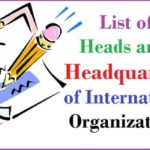21 Most Important Things To Do In a Job Interview
1. Examine and study about the company:
You need to research fully and study the entire what-about and how-about doings of the company so that you will be more knowledgeable if an interviewer asks you about the company profile you have come for the interview.
You need to thoroughly examine and study about the company on the Google and you should be well-versed of its overall summary and conglomeration (if any).
2. Practice frequently asked interview questions:
You often need to prepare and revise ordinary interview points and/ or questions which every interviewer asks the candidate.
Mostly everybody is aware of such questions. If not, you can search on Google to have a look and can practice easily.
Likewise, your introduction, your hobbies and interests, your intelligence & knowledge about the job position etc.
3. Keeping copy of resume/ CV in interview file:
Never forget to keep 3-4 copies of your CV or resume while going for an interview.
Specifically should not assume that HR people must be having your CV so let it go like anything. Should keep extra copies of CV along with you and a passport size photograph too.
4. Never subsist behind schedule:
Punctuality is one of the proficiency that employers look in the candidates. Always reach the interview venue on time, whatever could be the reason.
Never reach late because it will also count in your negative points. Once you get late, you will not be given another chance to consider any of your excuse.
You cannot even apologize and ask for rescheduling. So better not to get late and always be on time especially on first day of interview.
5. Make your introduction more profound:
When the interviewer asks you about your self-introduction you should take 2-3 minutes to answer it.
Should be a type of story-telling including your born place, current residing place, parents do about, mentioning of siblings, any hidden talent or interest etc.
Interviewer would judge your verbal communication skills too if asks you to talk more about your personal or professional existence.
6. Proper outfit is vital:
While going for an interview, your utmost focus should be on your outfits. That’s more important in fact. Like you cannot wear normal casual merriment attires when going for an interview.
Your dressing sense also reflects your normal living skills too. Accordingly, wearing formal clothes gives you more professional and sophisticated look which actually is a positive sign.
7. Use of appropriate verbal communication:
Engaging and interacting with the interviewer sometimes makes you more comfortable that people forget that they are in an interview.
Besides, they start using regular language which is not a good sign. You should never use inappropriate words or sentences as this sheds unconstructive feedback about you. Use of proper idiom is must.
8. Affirmative code of behavior:
It is a fact, that first impression is the last impression. Consequently, above and beyond, interviewer is specific and notices more about the attitude of the candidate.
Your enthusiasm level should be high and you should pose like you are really passionate to get the job and keen to be part of the organization. Such optimistic attitude helps you to earn good ranking.
You should be polite and use soft words while introducing yourself. The message of high demanding, hygiene lover or even remuneration wise too, should not be conveyed from your talks and postures.
9. Be cognizant with interview etiquettes:
The list of “do’s and don’ts” is too vital for superior interview etiquettes. Be attentive of your body language.
Be confident and firm while shaking hands with an interviewer. Speaking politely and professionally sound, you need to avoid using slang.
Most importantly your words should be clear, proficient and transparent so that chances of any miscommunication are almost less.
10. Never say off-putting about previous employer:
Otherwise this is a common thing which everyone should strictly follow. You should not utter even a single negative judgment about your previous employer, whether you have left the organization on a good or on a bad note.
This will also impact on your own character and leaves a dreadful notion about yourself too.
11. Clarification of selling points:
You should clarify your selling points very clearly in front of interviewer so that it could define what makes you more suitable for the position, your willingness and interest about the job profile.
Similarly do not become too much informal while interacting, that you forget describing main points of your profile.
12. Expectation of interviewer’s concerns:
The interviewer may ask you anything out of the story or whatever is his concern. You should be smart enough to answer any of his queries on the spot and with well aptness.
Your reaction should not be displayed as confused or in a puzzled form. The concern of interviewer should be conferred very obsessively.
13. Gathering of your self-assessed questions:
Line up your own questions to ask the interviewer for knowing about more about the company profile and the engagement of the organization.
This reveals your positive attitude and your self-interest in joining the company. Of course, it must be your first right to know and moreover keeps your aptitude level high.
14. Essentiality of practice:
This is the foremost rule of practicing over and again before appearing in an interview. Because many times candidates get puzzled and confused while answering to the questions of the interviewer.
Subsequently without getting confused, you should revise and practice usually asked questions rigorously prior to the interview so that you should be confident enough while answering.
15. Mental and physical soundness:
The first and foremost rule of an interview is that you should be mentally and physically sound to appear in any interview.
Deep research and good resume is only valid if you are mentally strong and physically fit to face questions of an interviewer.
Therefore, a must point to keep in mind. You should keep aside all your worries and anxiety, while going for an interview purpose.
16. Making list of own selling points:
You should emphasize on what really makes you apt for the said position for which you are being interviewing.
Tell about your skills, knowledge about the job position, experience in the field and achievements first and later move to story-telling and other stuff.
It is your solitary responsibility that the interviewer should walk away from the cabin, only after knowing your skills and endowment.
17. Preparing to handle illegitimate and incompatible questions:
You should be ready to handle inapt questions as well. Interviewer could ask you anything apart from your professional and personal life, just like some general questions happening in the society and your views as an audience to know about your intellectual and political views.
18. Think and create positive atmosphere:
No one likes a pessimistic kind of person. Even if you are facing some negative situations in your personal life or have had some bad experiences, you should not let the other person know about it.
You should keep and pose encouraging stance. Every answer of yours should show your optimistic view.
19. Too much practice sounds polished rehearsal:
Candidates often think that too much practicing of FAQ’s (frequently asked questions) gives reflection of polished and persuasive rehearsal.
But if you will not prepare yourself, you will get puzzled and cannot answer confidently. It’s a perfect saying, “Practice makes a man perfect” so practice sounds more certainty.
20. Be firm and take conscientiousness for the interview:
You should behave well- mannered, polite and take full accountability of the interview since it is you only who reacts in response to the firing of questions.
Some candidates become inactive during interviews and unable to respond even having willingness to answer. Such mistakes may lead your profile dumped into a rejection file.
21. Always send thank you note after interview:
A good and a chivalrous way to end is a thank you note to be sent to the person who has interviewed you or to the HR person.
It also keeps your rating high and helps your profile to get good ranking visibility when the time comes to finalize the candidate out of the many who had appeared.
So don’t put out of your mind to say thank you to the interviewer via email or through a personal letter.
















